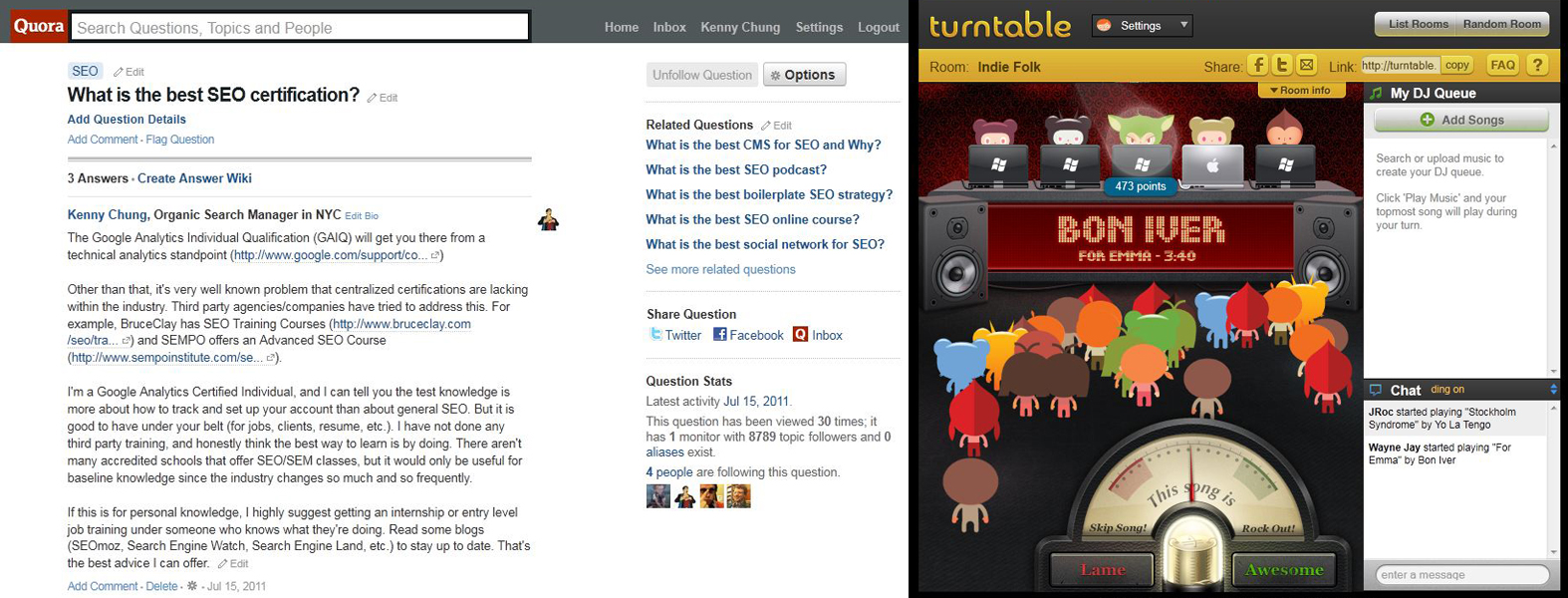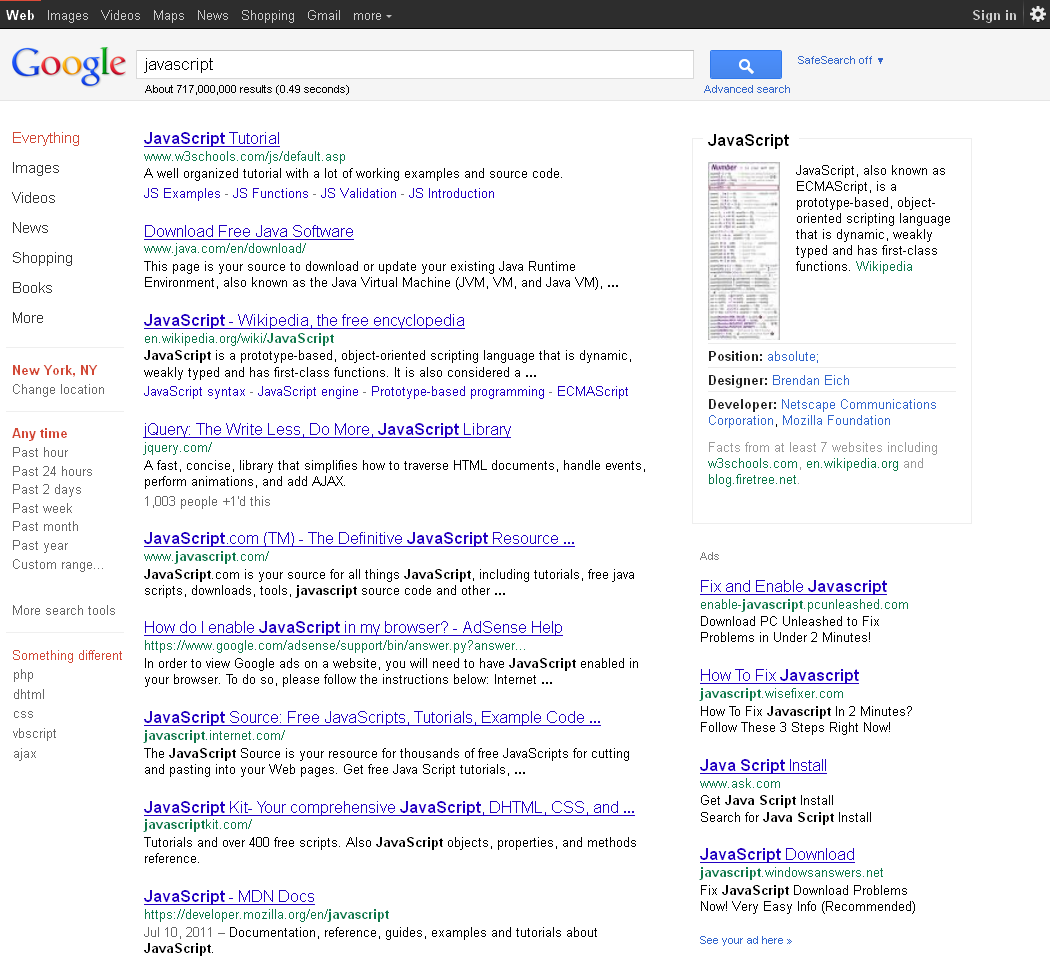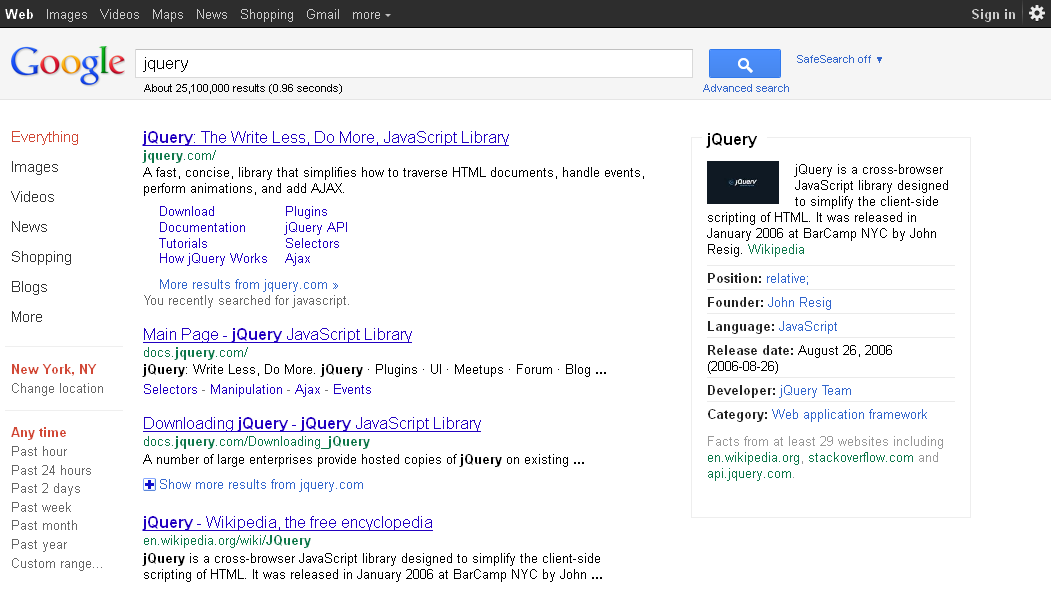I’m going to lead off by saying that I could have named this blog post many different things, and they all would have been accurate. One title that I threw around was “Crowdsourcing 2.0 – Translating Reward Systems to Web 2.0.” Another was “Quora vs. Turntable.fm: A Tale of Two Reward Systems.” But alas, I ended up with a title somewhat amalgamating the two: “Quora vs. Turntable.fm: Intrinsic vs. Extrinsic Motivation in Crowdsourcing.” While I’ve written about the value of crowdsourcing before (Crowdsourcing- wisdom of the masses?), this post is not so much an update, as it is an analysis of two sites that I feel are doing it right.
I’ll start off with a brief introduction of the services, as I am wont to do: Quora is a question and answer site, much in the vein of Yahoo! Answers. The main difference is that it’s not anonymous, so the answers are typically of higher quality and many respondents are actually professionally qualified to give their opinions (as long as you stay out of the Psychology Quora page). Users can vote up or down each answer that a question receives, and they can also “Thank” someone for their answer. The difference (at least from what I’ve read in a Quora thread) is that voting means you think a response is the most appropriate answer, whereas Thanking someone could mean you appreciate their effort or unique input.
Turntable.fm is a crowdsourcing music website where the “audience” listens to up to 5 users (DJs) take turns playing songs. The crowd can vote a song up if they like it or down if they want it to change. Each positive vote gives the DJ who selected the song 1 point. Alternatively, if enough people vote down a song, the song skips and the next DJ gets to have their shot in the limelight. Points can be used to change your user avatar into something either ridiculously large or just ridiculously “expensive”.
 Quora vs. Turntable.fm – Slightly different audiences
Quora vs. Turntable.fm – Slightly different audiences
Obviously, Quora and Turntable.fm are about as different as you can get in terms of social media websites. I’ve been using both a lot more lately (just to plug, here’s a link to Quora/Kenny-Chung, where I answer questions about SEO, Graphic Design/UX, Psychology, etc.). Both were quite addictive to use, but the area that interested me the most was how different their reward systems truly were.
And now (as I am also wont to do), I’ll provide some basic psychology 101 terminology. Intrinsic motivation refers to when someone does a task or chore because they want to (because they like doing it, if they like helping others, etc.). Extrinsic motivation means that someone is doing something for reasons outside of themselves (money, to avoid consequences, to be better than others, etc.). Those are highly simplified explanations, but they’re adequate for the purposes of this blog post.
With regard to these two sites, Quora uses intrinsic motivation to drive user responses (the votes and Thanks don’t amount to anybody’s profile being quantitatively better than someone else’s, unlike on sites like Reddit). Yahoo! Answers has the opposite approach. There, users gain points for answering questions, for being chosen as the best response, or for voting. This is a form of extrinsic motivation, and it can be argued that that’s why the community answers there are so… terrible. Because Quora targets knowledgeable and educated people to begin with, intrinsic motivation is more naturally suited for its user base. And from personal experience, it actually does feel good to know that I could help someone out with the knowledge that I’ve accrued over the years.
On the other hand, Turntable.fm is driven by extrinsic motivation (for its DJs). The reason people spend their time picking songs for others to listen is for points. While it’s very possible that people enjoy the music they choose, sharing a space with others, and spreading knowledge of their favorite bands, I’ve found that most rooms are an exercise in self-affirmation, with the DJs choosing popular/safe songs in fear of being skipped and not gaining any points. But for a site where the focus is all on the audience’s enjoyment, I think it works well.
So is one reward system better than the other? Yes and no. It depends on context. It’s hard to tell which is the chicken and which is the egg, but reward systems attract certain types of people, and certain people are attracted to certain types of reward systems. There’s a barrier of entry to answering questions on Quora (actually possessing knowledge), whereas Turntable.fm is more for fun and anybody can join (well, only if you’re Facebook friends with someone already using it).
I’m going to end with a well known idiom- “different strokes for different folks.” Especially in this growing online environment of crowdsourcing, the most important consideration when building a loyal fanbase is whether or not users are engaged and if they have any reason to be. And the best way to do that is by motivating users properly.
So next time you’re on a social networking site, take a step back and see how they’re getting you to do what they want you to. And if you’re thinking of starting your own web service with a reward system, my only advice is to choose wisely.








